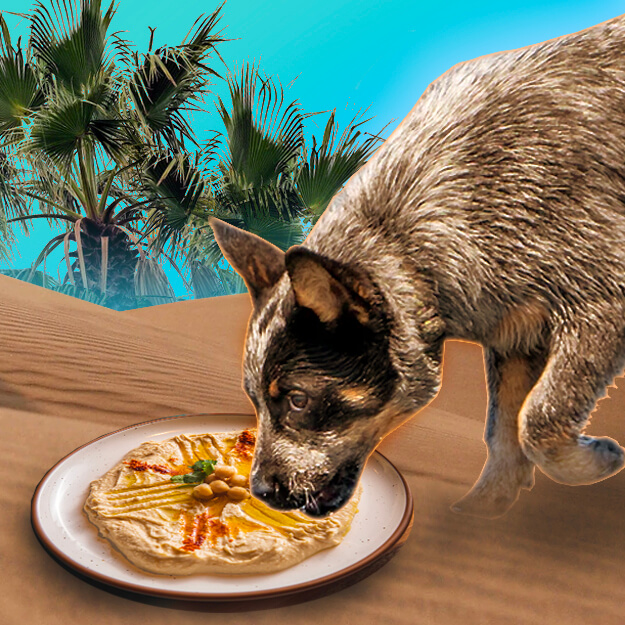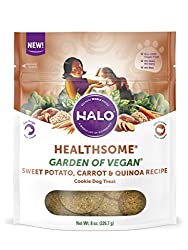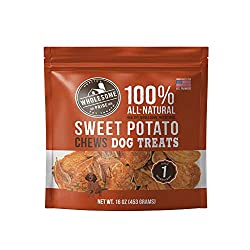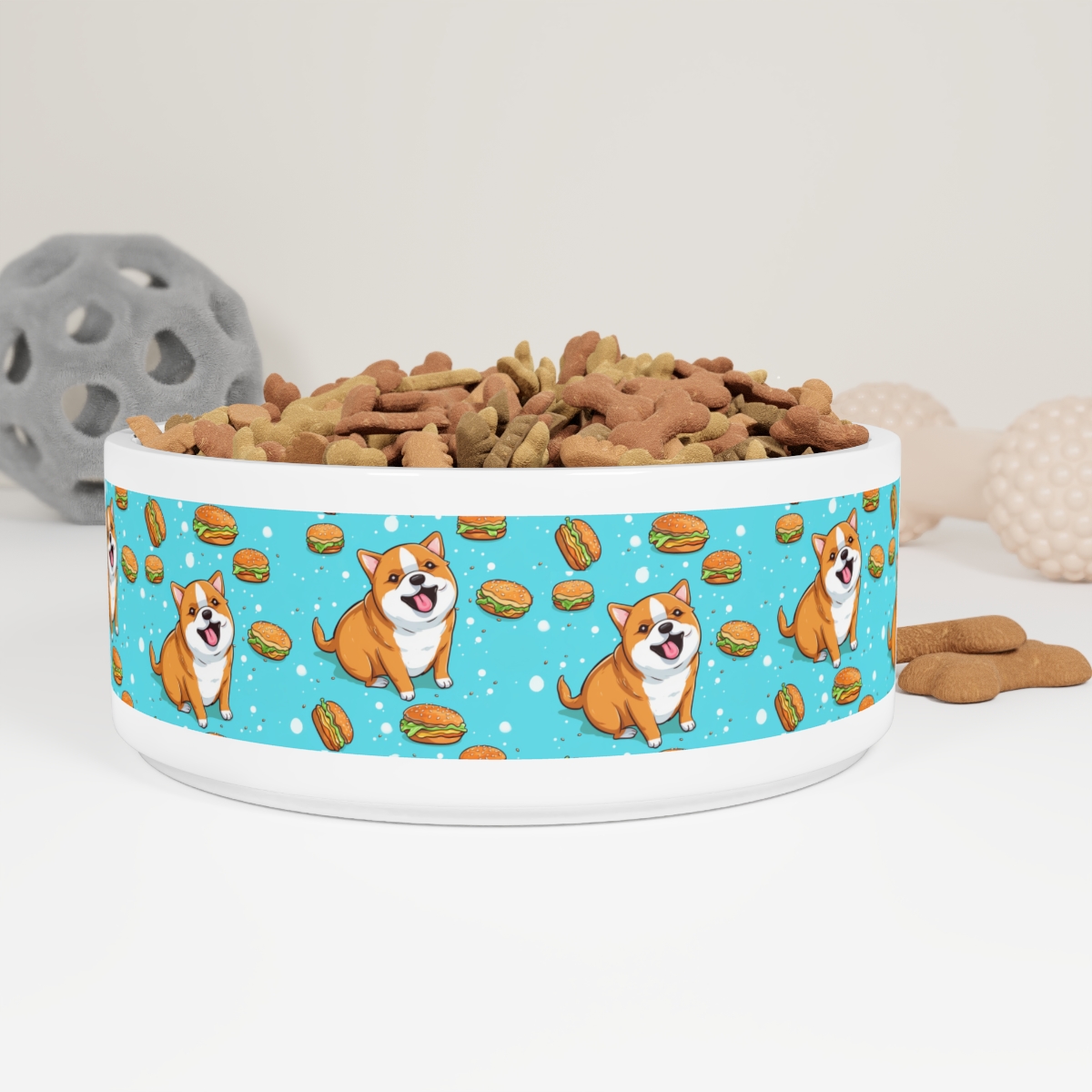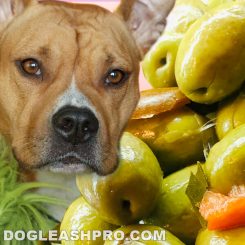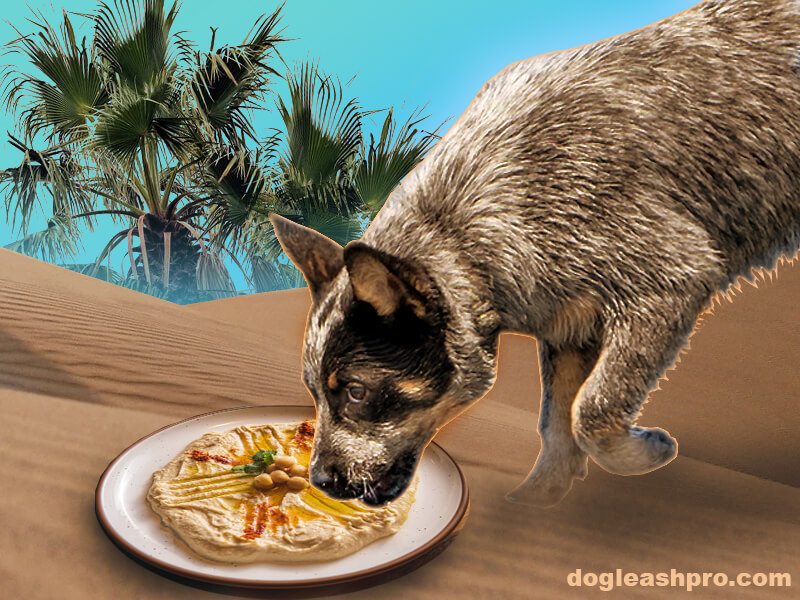
Can dogs eat Hummus? No, dogs cannot eat Hummus. Hummus that is made up of ingredients like garlic, onion, or a large amount of oil is toxic for dogs. The only ingredient in Hummus that is safe for your pup is chickpeas. If you have to, it is fine to serve only a small amount of plain Hummus to your dog.
If you’re making Hummus at home, you’re probably using Chickpeas or garbanzo beans with a ton of other ingredients. Whether your Hummus is homemade or store-bought, your canine friends are probably sitting close by begging you for some. So can my dog eat Hummus? Are Hummus safe for dogs to eat?
It’s important to keep in mind that Hummus is made for human consumption. Let’s dive deeper into what Hummus is and what Hummus is made of so you know why this delicious dip or spread for humans is terrible for our four-legged friends.
Table of Contents
Can dogs have Hummus?
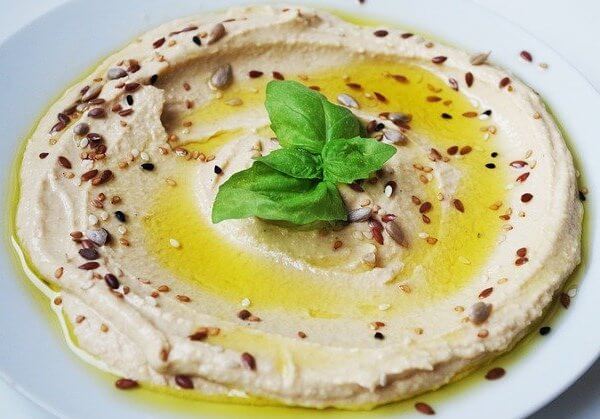
No, dogs should not have Hummus. If you want to share a small amount of Hummus with your canine friends, ensure it is plain with no added flavoring or salt.
That’s because some ingredients in Hummus, such as garlic and onions, can be toxic to dogs.
Additionally, the high-fat content from the tahini and oil can lead to gastrointestinal issues and weight gain in dogs.
What is Hummus and what is Hummus made of?

Hummus is a non-traditional but commonly used dip that can also be used as a spread. Hummus is an Arabic word that means chickpeas. It’s a Middle Eastern dish usually used in Egypt, Turkey, and nearby countries.
The history of Hummus dates back to the 13th century. Who invented Hummus is still questionable! Some of the written recipes resembling Hummus are found in cookbooks written in Cairo.
However, history shows it is mainly used in Middle Eastern countries including Greece. Hummus is most commonly used in Egypt where it is eaten with a special type of pita bread. It is usually consumed as an appetizer, for example:
- Dip with crackers.
- Spread on the bread.
- Spread with potatoes or carrot sticks.
- Used as a salad dressing.
- Seasoning with vegetables.
- Bean dip.
- In burgers to make them juicy and tasty.
Hummus is made out of chickpeas, garlic, lemon juice, onion, sesame seeds, olive oil, and salt. It is made by combining all the ingredients into the blender to become a smooth paste-like texture and then garnish with sesame seeds. Sesame seeds are also used in blending all ingredients to make them rich in flavor.
Is Hummus bad for dogs?
Yes, Hummus is bad for dogs. Unlike Chestnuts where it actually contains some nutritional benefits for dogs, the toxic ingredients in Hummus overwhelm the benefit of its main ingredient, chickpeas. Several ingredients in Hummus can cause serious negative effects on the dog’s digestive system.
Here are the ingredients in Hummus:
Chickpeas
Chickpeas are safe for dogs if they are cooked naturally. There is no harm in giving dogs chickpeas if it’s in a moderate quantity as mashed or boiled form. Chickpea is a plant-based protein and it is good for your dog’s health. Canned chickpeas, on the other hand, are not recommended as it is highly processed, artificially preserved, and contain high levels of salt.
Garlic
Garlic is the most dangerous ingredient for dogs as it is toxic and poisonous when it is blended with other ingredients in the Hummus. It directly damages the red blood cells of the dog. Avoid giving them Hummus and immediately see your vet if your canine licks the Hummus off of your plate in large quantity.
You might also like: Can Dogs Eat BBQ Sauce?
Lemon juice
Lemon is a citrus fruit that is acidic. It contains psoralens. When it is combining with the dog’s digestive system, it can become dangerous and causes indigestion
Olive oil
1 teaspoon of olive oil for a weight of 20 pounds is a fair quantity for any dog to have. A small quantity of olive oil in your dog’s food will not harm his health or digestive system.
Onions
Onions cause a potential risk to your dog’s health. It is as dangerous as garlic as it also damages your dog’s red blood cells. This can cause anemia in dogs. If onion poisoning is not treated immediately, it may be fatal.
Signs and symptoms of onion poisoning in dogs include:
- Extreme thirst leading to excessive water consumption.
- Frequent urination.
- Urine is red.
- Onion breathe.
- Drooling.
- Mouth and tongue irritation.
- Feeling nauseous leading to frequent vomiting.
- Diarrhea.
- Lethargy and weakness.
- Loss of appetite.
- Pale or blue gums.
- Abdominal pain causing your dogs to hunch over and whine.
- Increase heartbeat or heart rate (tachycardia).
If you suspect your canine friends have onion poisoning, contact your vet immediately. This requires immediate medical attention and the sooner it is treated, the better.
Sesame seeds
If sesame seeds are consumed in a moderate amount, then it is a safe ingredient for dogs. Sesame seeds are not toxic to dogs and they can be enjoyed with boiled mashed chickpeas.
Is Hummus good for dogs?
Many commercial or store-bought Hummus are unsuitable for dogs because they contain harmful ingredients such as garlic and onion and have tons of oil.
The only ingredient in Hummus that is good for dogs is chickpeas. When consumed in small amounts or in moderation, they can provide protein, vitamins, and minerals to support your pup’s overall health.
Some of the essential nutrients in chickpeas that benefit our furry friends include protein, fiber, iron, potassium, magnesium, folate, and vitamin B6.
These nutrients can aid in digestion, maintain a healthy immune system, and support strong muscles and bones in dogs.
Is Hummus safe for dogs?
The only ingredient in Hummus that is safe for canine consumption is chickpeas. As discuss above, chickpeas are safe and beneficial for dogs when consumed in small amounts or in moderation.
Is Hummus ok for dogs?

From the information presented above, Hummus is not okay for dogs due to certain ingredients like garlic and onions, which can be toxic to them.
The high-fat content from tahini and oil may also lead to gastrointestinal issues and weight gain.
However, if the Hummus only contains chickpeas alone, without the harmful ingredients, then it is safe and beneficial for dogs to eat in moderation.
When shouldn’t you feed Hummus to your dog?
You should never feed Hummus to your dogs. However, if you still think that Hummus is his favorite food, then go ahead and make Hummus without the onion, lemon, and garlic. This way, the Hummus will be safe for him to eat.
If you’re making Hummus for your pooch from scratch, avoid using canned chickpeas because they contain preservatives that are bad for your dog’s stomach and digestive system.
Can dogs eat plain Hummus?
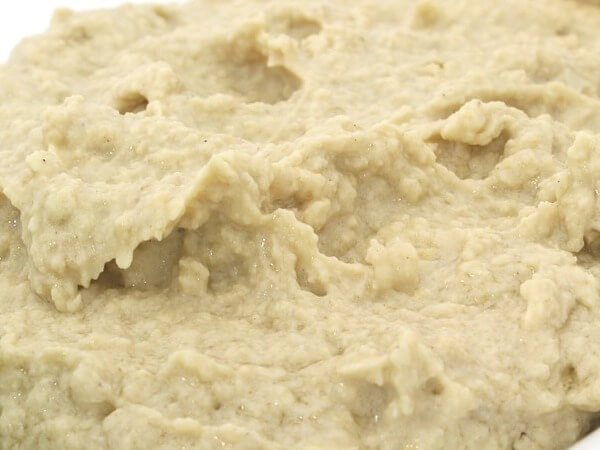
Of course, plain Hummus without garlic, onion, and lemon is safe for your dog. This can be a dog treat. Your dog’s size and weight play an important role when knowing how much plain Hummus to feed them.
A dog’s daily consumption requirement according to its weight is between 25 to 26 calories.
Here’s the breakdown of different-sized dog breeds:
Large-size breeds
For large dog breeds, 3 tablespoons of dog-friendly Hummus is sufficient once or twice a week.
Medium-size breeds
For medium-size dog breeds, 2 tablespoons of dog-friendly Hummus is appropriate once or twice a week.
Small-size breeds
For small-size dog breeds, 1 tablespoon of dog -friendly Hummus is suitable for your pup once or twice a week.
Dogs and Hummus
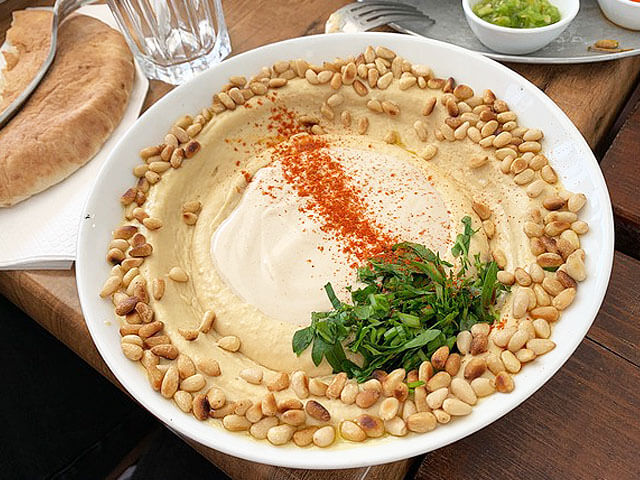
Hummus is a popular dip that comes in various flavors, including classic, roasted garlic, roasted red pepper, and spicy jalapeno.
However, it’s important to note that these flavors may contain ingredients like garlic and onion that are toxic to dogs, making Hummus unsuitable for canine consumption.
Below, let’s discuss the various flavors that Hummus comes in and whether they are safe for doggy consumption.
Can dogs eat Hummus dip?
No, dogs should not eat Hummus dip as it contains ingredients like garlic and onion that can be toxic to dogs. Consuming these harmful ingredients can lead to digestive problems and potential damage to your canine friend’s red blood cells.
Can dogs eat garlic Hummus?
No, dogs cannot eat garlic Hummus. Garlic is very dangerous to dogs. If your pup accidentally consume garlic Hummus, they may experience symptoms such as vomiting, diarrhea, and weakness.
Garlic contains two compounds that are dangerous to our furry friends: thiosulphates and disulfides. Once ingested, the garlic in garlic Hummus can lead horrible health conditions such as Heinz body anemia, hemolytic anemia, and even methemoglobinemia.
All of these conditions causes damage to your dog’s red blood cells.
This is why it is crucial that your pups avoid any foods containing garlic, including garlic Hummus, from their diet.
Can dogs eat Hummus without garlic and lemon juice?
Yes, dogs can have Hummus without garlic and lemon juice. It is recommended to avoid onions as well in the dog-friendly Hummus.
Can dogs eat Hummus chips?
No, dogs should not eat Hummus chips. Dog owners are advised not to feed Hummus chips to dogs, as they often contain high levels of salt and additional spices such as garlic and onion powder that can be harmful to your four-legged friend’s health.
Regularly eating Hummus chips can lead to potential health issues such as digestive issues and dehydration.
Therefore, it is best that our furry friends avoid Hummus chips and stick to dog-friendly and dog-specific treats to ensure their safety.
Can dogs eat red pepper Hummus?

No, dogs should not eat spicy red pepper Hummus. Red pepper Hummus is a popular variation of Hummus that is made with chickpeas, tahini, olive oil, lemon juice, roasted red peppers, garlic, salt, and various spices.
While these ingredients may be safe for human consumption, they may not be suitable for dogs.
Let’s take a closer look at each of the ingredients in red pepper Hummus and see how they may affect your furry friend’s health.
Chickpeas
Chickpeas are the main ingredient in Hummus, and they are a good source of protein and fiber for humans.
However, dogs do not need as much protein and fiber in their diets as humans do, and consuming too much chickpeas can lead to digestive problems such as bloating, gas, and diarrhea.
Additionally, some dogs may be allergic to chickpeas, so it’s important to monitor your dog’s reaction after consuming any food that contains chickpeas.
Tahini
Tahini is a paste made from ground sesame seeds, and it’s a common ingredient in Hummus.
While tahini is a good source of healthy fats and protein for humans, it’s high in fat and calories, which can contribute to weight gain and obesity in dogs.
Additionally, some dogs may be allergic to sesame seeds. We highly recommend that you monitor your furry friend’s reaction after consuming any food that contains tahini.
Olive Oil
Olive oil is a heart-healthy oil that is used in many Mediterranean dishes, including Hummus.
While olive oil may be safe for dogs in small amounts, it’s high in calories and fat, which can contribute to weight gain and canine obesity.
Additionally, consuming too much olive oil can cause digestive problems such as diarrhea and vomiting in dogs.
Lemon Juice
Lemon juice is another common ingredient in Hummus, and it adds a tangy flavor to the dip.
While lemon juice may be safe for dogs in small amounts, it’s high in citric acid, which can cause digestive problems such as stomach upset and vomiting in dogs.
Roasted Red Peppers
Roasted red peppers are a popular ingredient in red pepper Hummus, and they add a sweet and smoky flavor to the dip.
While red peppers are a good source of vitamin C and other antioxidants for humans, they may not provide the same health benefits for our four-legged friends.
Additionally, consuming too much red pepper can cause digestive problems such as diarrhea and vomiting in dogs.
Garlic
It isn’t Hummus without garlic. This ingredient adds flavor to the Hummus dip. However, garlic is toxic to dogs and can cause digestive problems, anemia, and other health issues.
Even small amounts of garlic can be harmful to your precious pups, so it’s important to avoid feeding any food that contains garlic to your furry friend.
Salt
The salt in Hummus is used to enhance the flavor of the Hummus dip. However, consuming too much salt can be harmful to dogs and can lead to dehydration, high blood pressure, and other health problems.
Additionally, some dogs may be sensitive to salt and may experience digestive problems such as vomiting and diarrhea after consuming food that contains high levels of salt.
Spices
Red pepper Hummus may contain various spices, such as cumin or paprika, for added flavor.
While these spices may be safe for dogs in small amounts, consuming too much can cause digestive problems such as stomach upset and vomiting in dogs.
Additionally, some dogs may be allergic to certain spices.
Can dogs eat Sabra Hummus?
No, dogs should not eat Sabra Hummus. It has artificial flavors and toxic ingredients.
The typical ingredients in Sabra Hummus include chickpeas, tahini (sesame paste), soybean oil, garlic, salt, citric acid, and potassium sorbate.
Several of these ingredients can be harmful to dogs. They are:
Garlic
Garlic is toxic to dogs, as it can cause gastrointestinal upset, anemia, and even organ damage in severe cases.
Salt
A typical store-bought Sabra Hummus contains approximately 120 mg of salt per 2 tablespoons (28 grams) serving. This can vary slightly depending on the specific flavor or variety of the Hummus, so always check the nutritional label for accurate information.
Keep in mind that a dog’s daily salt intake should be around 0.25 grams to 1.5 grams per 100 grams of food, depending on the dog’s size and activity level.
Excessive salt consumption can lead to health issues, so providing a balanced diet that meets their nutritional needs without overloading them with sodium is essential.
High sodium content in Sabra Hummus can lead to excessive thirst and urination, as well as sodium poisoning in dogs. Dogs with salt toxicity may experience symptoms such as vomiting, diarrhea, tremors, and seizures.
Citric acid
While not inherently toxic, citric acid can cause stomach upset in dogs, leading to vomiting or diarrhea.
As we can see, it is best to avoid feeding Sabra Hummus to your canine friends to ensure their safety and overall health.
Instead, provide them with dog-friendly treats and food that are specifically formulated for their nutritional needs.
How do I make Hummus for my dog at home?
You can make hummus for your dog by boiling the chickpeas and mashed them properly or blend them with olive oil and sesame seeds.
What if my dog accidentally eats Hummus?
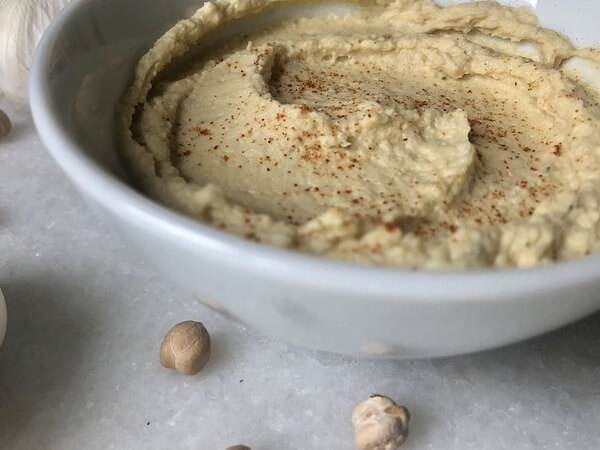
Before you freak out, find out how much Hummus your canine has consumed. If your dog accidentally ate a little bit of Hummus, stay calm. There’s no need to panic. A small amount may not cause a huge problem on your dog’s stomach and digestive system.
However, if your pup ate a bit too much Hummus, then they may have garlic poisoning. Observe him carefully and see if you notice the following symptoms:
- Drooling.
- Vomiting.
- Nauseating.
- Continuous abdominal pain.
If he is having these symptoms, take your dog to the vet immediately.
Some dogs may be fine after eating a large amount of Hummus, but it’s crucial to continue monitoring them. There may be long-term damage that you may not be able to see right away. Sometimes it takes years to see this toxicity take in the form of organ damage or other health problem.
More symptoms to watch for
As mentioned above, the common symptoms of eating too much Hummus include vomiting, diarrhea, fatigue, and drooling.
Your dog may suddenly become quiet or become lethargic. He may not roam around the house as he had before or stop playing with you due to the pain he’s experiencing.
Here are more symptoms to watch out for in your dog:
- Nausea.
- Vomiting.
- Cramps.
- Diarrhea.
- Fatigue.
- Drooling.
- Losing interest.
- Continuous Pain.
- Salivation.
- Dizziness.
- Low-grade fever.
- Trouble breathing.
- Weakness.
Treatments if your dog has Hummus poisoning
If your four-legged friend has eaten a lot of Hummus, you should see the vet right away. The vet will perform a physical examination on your dog and do some lab tests to check your dog’s blood pressure. He or she may ask about your dog’s medical history and diet. Several tests will be performed to see the level of toxicity in your dog’s body.
The treatment to cure Hummus poisoning is flushing the toxicity from your dog’s body. If the Hummus was consumed recently, the vet may induce your dog to vomit by activating charcoal. This will stop the toxicity in your dog’s digestive system.
If this method doesn’t work, then the dog’s digestive system will be flushed with a saline solution to remove all the toxicity caused by eating Hummus.
What are some dog-friendly and safe non-toxic Hummus alternatives?
There are several safe and non-toxic alternatives to Hummus. You could make Hummus without garlic and lemon. These two ingredients are extremely harmful for your canine pooch.
Whenever I’m having Hummus with my pita bread, my Labrador comes to me with her puppy eyes. I give in, but I don’t give her Hummus. Instead, I give her either the vegan grain-free dog treats with sweet potato, carrot, and quinoa flavors or the vegan, gluten and grain-free all-natural sweet potatoes dog treat.
Here are other alternatives to Hummus that you can give your pooch:
Boiled and mashed chickpeas
Freshly boiled chickpeas are the best meal for your dog. If you want to make it like Hummus, all you have to do is blend these chickpeas with a few drops of olive oil and sesame seeds to make a flavored dish for your canine.
Boil broccoli and squash
Boil vegetables like broccoli and squash is another option to make a healthy meal for your little pooch. Wash and boil them well and blend them to make a paste. Don’t serve the food when it’s hot. Make sure the boiled broccoli and squash cools down before you give them to your pup.
Brown rice and sweet potatoes
Your dogs will love freshly boil brown rice and sweet potatoes. It’s best to make two portions, one of each in a dog bowl, and serve them at room temperature. This meal is not only filling but also healthy.
DON’T MISS: Are Ceramic Bowls Safe For Dogs?
So, can dogs eat Hummus?
Hummus is a delicious dip and is made for human consumption. Before we give Hummus to our dog, it’s important to know how our pup’s digestive system may react to eating it. Hummus is one of many human foods that can harm your dog’s health. We need to be vigilant before feeding our dog Hummus.
More Hummus questions
No, dogs cannot eat roasted pine nut Hummus even if it is made without garlic and lemon juice. It is high in fats and phosphorous and this can cause a lot of irritation in a dog’s digestive system.
Yes, dogs can eat tahini. It is safe for your dogs to eat if it is given in a small quantity.
Yes, your dog can have chickpeas freshly boiled or mashed.
1 to 2 drops of olive oil is fine for your dog to have per meal.
DISCLAIMER: THIS WEBSITE DOES NOT PROVIDE MEDICAL ADVICE
The information, including but not limited to, text, graphics, images and other material contained on this website are for informational purposes only. No material on this site is intended to be a substitute for professional veterinary advice, diagnosis, or treatment. Always seek the advice of your veterinarian or other qualified health care provider with any questions you may have regarding dietary needs.
Resources:
https://en.wikipedia.org/wiki/Hummus
https://www.petmd.com/dog/emergency/poisoning-toxicity/can-dogs-get-food-poisoning

With over five years of specialized experience as an animal writer, my expertise lies in dog nutrition, health, behavior, grooming, and training. I am dedicated to delivering helpful and informative content that caters to the well-being of our furry friends. My primary goal is to empower pet owners with knowledge and ensure our canine companions thrive in health and happiness. In my free time, I love volunteering at local dog rescue centers.
